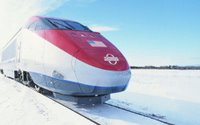
Last time we discussed the climate change impact of airplane travel. Bottom line: a couple of flights can easily wipe out all your other efforts to live a low-carbon lifestyle, so fly only when you absolutely need to and be sure to offset your flight's climate impact.
Now for trains.Ground-based public transport is low-carbon because the emissions from the train or bus can be spread over a large number of passengers. A packed train does not consume much more energy than an empty one, so the more people you can cram into each train, the lower the emissions per passenger mile. Similarly, high-speed rail is not significantly more polluting than slower trains, so Government support for faster trains to replace short-haul flights can make a big difference. And with any luck you can walk or bike to the station - which is after all the cleanest and healthiest way to travel.
A moderately full train emits only
As you pay your fare and squeeze into your train carriage on the way to work tomorrow morning, take a moment to smile at all the other passengers joining you on the way to a low-carbon economy. You might even enjoy the trip.

